- Home
- Block, Lawrence
Manual For Fiction Writers Page 2
Manual For Fiction Writers Read online
Page 2
Ê
Even more than writing in general a monthly column is a two-way street. From the column's inception I have received letters in a steady stream?letters offering suggestions, letters seeking advice, letters thanking me or calling me to task for something I did or didn't say. Both the volume and the fervor of this correspondence continually impress me with just how important all of this business of stringing words together is to all of us who do it. Whatever our degree of commercial or artistic success, whether we be fresh as paint or older than rust, writing appears to be an imperative.
Letters from readers often furnish me with ideas for future columns. Equally important, the feedback they constitute keeps me in touch with my audience and with my material. I read every letter I get, and I reply to most of them. I almost always reply to those accompanied by a stamped self-addressed envelope. A word to the wise-
This present volume had its origin in correspondence. Any number of readers have written suggesting that my columns might be collected and published in book form. While I have to admit that the very same idea did occur to me all by itself, the letters helped assure me that a market for such a book existed.
It has been an interesting experience editing four years' worth of columns for book publication. I have done relatively little editing, largely confining myself to changing column to chapter now and then, and deleting occasional duplications from one column to the next. I have, too, been able to correct mistakes, both grammatical and factual, although I don't doubt for a moment that I have unwittingly left numerous examples of both sort uncorrected.
Sometimes, rereading this material, I've been struck by a tendency to say the same thing over and over. At other times it seems to me that I give conflicting advice from one month to the next. Ultimately I've decided not to apologize for either the redundancy or the contradictions. They strike me as inescapable in material written at various times and from various perspectives.
Ê
Several persons deserve my thanks in this venture. The good people at Writer's Digest, especially John Brady, Rose Adkins, Bill Brohaugh, and publisher Dick Rosenthal, have been unfailingly helpful and supportive since the column's inception. Book publication might not have happened but for the encouragement and enthusiasm of Don Fine of Arbor House; I know no one in the industry who cares more about fiction, or publishes it with greater conviction and respect.
Jared Kieling, my editor at Arbor House, is responsible for the book's scheme of organization. It was he who was able to see that the columns grouped themselves naturally into four general areas?fiction as a profession, as a discipline, as a structure, and as a craft. I embraced this plan wholeheartedly, finding it potentially more useful to the reader than the two organizational modes which had occurred to me?viz., chronologically and alphabetically.
When I write a column, it's impossible for me to know if anyone will find it useful. The nuts-and-bolts columns of Part Four seem to me to offer the most real help to a writer, and yet it is almost invariably the more general inspirational columns which draw the heaviest reader mail. Of course what's helpful and what prompts one to respond may not be the same thing.
In any event, it's similarly impossible for me to know how valuable readers will find this book. I know that it's been enormously valuable to me to write it, column by column, and I have all of you who read it to thank for the opportunity.
New York CityMarch 9, 1981
PART ONE
The Liar's Trade:
Fiction as a Profession
CHAPTER 1
Setting Your Sights
A COUPLE of months ago I returned to Antioch College to teach an intensive week-long seminar on fictional technique. One of the first things I remembered as I crossed the campus was a cartoon which had been displayed on the English Department bulletin board during my first year as an Antioch student. The cartoon showed a sullen eight-year-old boy facing an earnest principal. It's not enough to be a genius, Arnold, the man was saying. You have to be a genius at something.
I recall identifying very strongly with Arnold. I had known early on that I wanted to be a writer. But it seemed that it wasn't enough merely to be a writer.
You had to sit down and write something.
Some people receive the whole package as a gift. Not only are they endowed with writing talent but they seem to have been born knowing what they are destined to write about. Equipped at the onset with stories to tell and the skills required to tell them, they have only to get on with the task. Some people, in short, have it easy.
Some of us don't. We know that we want to write without knowing what we want to write.
How are we to decide what to write?
By chance, I suspect, more often than not. Yet there seem to be some steps one can take in order to find oneself as a writer. Let's have a look at them.
1. DISCOVERING THE OPTIONS. When I was fifteen or sixteen years old and secure in the knowledge that I'd been born to be a writer, it didn't even occur to me to wonder what sort of thing I would write. I was at the time furiously busy reading my way through Great Twentieth Century Novels, Steinbeck and Hemingway and Wolfe and Dos Passos and Fitzgerald and all their friends and relations, and it was ever so clear to me that I would in due course produce a Great Novel of my own.
I'd go to college first, naturally, where I might get a somewhat clearer idea of what constituted a Great Novel. Then I'd emerge from college into the Real World. There I would Live. (I wasn't quite sure what Capital-L Living entailed, but I figured there would be a touch of squalor in there somewhere, along with generous dollops of booze and sex.) All of this Living would ultimately constitute the Meaningful Experiences which I would eventually distill into any number of great books.
Now there's nothing necessarily wrong with this approach. Any number of important novels are produced in this approximate fashion, and the method has the added advantage that, should you write nothing at all, you'll at least have treated yourself to plenty of booze and sex along the way.
In my own case, my self-image as a writer was stronger than my self-image as a potential great novelist. I began reading books about writers and their work. I became a sporadic student of Writer's Digest. I loved the success stories and identified with their subjects. And, reading the market reports, I became aware that there was a whole world of professional writing that lay outside the more exclusive world of significant literature. I came to realize that, whatever my ultimate goals, my immediate aim was to write something?anything!?and get paid for it and see it in print.
I began reading a great many different kinds of books and magazines, trying to find something I figured I could write. I didn't care whether it was significant or artistic or even interesting. I just wanted to find something I could do.
2. YOU HAVE TO BE ABLE TO READ IT. When I was starting out, confession magazines were generally acknowledged to constitute the best and most receptive market for new writers. They paid fairly well, too.
I think I understood what a confession story was, the basic structure of its plot, and what made one story good and another unacceptable. During the year I spent working for a literary agent, the two confessions I pulled out of the slush pile both sold on their first submission, and the author of one of them came to be a leader in the field.
On several occasions, I bought or borrowed confession magazines and decided to read my way through them. I never made it. I could not read one of the damned things all the way through without skimming. I couldn't concentrate on what I was reading. And I couldn't shake the conviction that the entire magazine, from front to back, was nothing but mind-rotting garbage.
Nor, consequently, could I produce a confession story. The ideas my mind came up with were either numbingly trite or at odds with the requirements of the market. I never did turn any of these ideas into stories, never wrote a confession until one bizarre weekend when I wrote three of them to order for a publisher with a couple of holes to fill and a deadline fast approaching. Thos
e stories were awful. I wrote them because I'd taken the assignment, and the publisher printed them because he had to, and that was the hardest money I ever made.
I know other writers with similar experience in other fields. The moral is simple enough. If you can't stand to read a particular type of story, you're wasting your time trying to write it.
3. IDENTIFYING WITH THE WRITER. As a lifelong compulsive reader, I had little trouble finding categories of stories I could read with enjoyment. What I learned then, and have confirmed on many occasions since, is that just because I can read a particular story doesn't perforce mean I can write it.
For example, there was a time when I read a great deal of science fiction. I liked most S-F stories, and I liked the good ones a lot. Furthermore, I used to hang out with several established science-fiction writers. I found them a congenial lot, and I liked the way they grabbed hold of ideas and turned them into stories.
But I couldn't write science fiction. No matter how much of the stuff I read, my mind did not produce workable S-F ideas. I could read those stories with a fan's enjoyment, but I could not get the sort of handle on those stories that left me thinking, I could have written that. I could have come up with that idea, and I could have developed it the way he did. I could have been the writer of that story.
One of the things that makes a story work is that you identify with the characters. Well, one of the things that makes a story writable, if you will, is when you read it and identify not only with the characters but with the writer.
I remember the first time that happened. It was the summer after my freshman year at Antioch. I picked up a paperback anthology of short stories entitled The Jungle Kids. The author was Evan Hunter, who had recently made a name for himself with The Blackboard Jungle. I read the dozen or so stories in the book, all of them dealing with juvenile delinquents, virtually all of them originally published in Manhunt, and I experienced a shock of recognition. I identified, not so much with the characters in the stories, but with Evan Hunter himself.
I can still remember how excited I was when I got to the end of the book. Here was someone writing and publishing well-written stories that I could respect and enjoy?and I could see myself doing what he had done. I felt it was something I could do and I saw it as eminently worth doing.
Had I known then what I know now, I would have immediately gone to a back-magazine store and purchased every available copy of Manhunt. This never occurred to me. I did check one newstand, and when they proved to be out of the magazine I forgot all about it. I went on to write a couple of stories about juvenile delinquents, but they were lousy and I didn't try submitting them anywhere.
Some months later, I wrote a story about a young criminal. It had nothing in common with the Hunter stories, and I had indeed forgotten about them when I wrote it. A couple of months after that, I read the listing for Manhunt in a copy of Writer's Digest, remembered the magazine as having published Hunter's stories, and sent them mine. It came back with a note from the editor criticizing the ending. At that point I finally took the trouble to locate a copy of Manhunt, read it from cover to cover, and rewrote my story with a new ending. It was not, however, a very good ending, and it came back by return mail.
I kept reading Manhunt, however, and a month later I saw how to make the story work, and rewrote it once again, and they bought it, and I decided crime fiction was my metier. I can't say I've never regretted the decision, but I do seem to have stuck with it over the years. Now, as then, I'm sustained by the hope that, if I just keep at it long enough, sooner or later I'll get it right.
That shock of recognition, that identification with the writer, is difficult to describe but impossible to ignore. A similar epiphany preceded the writing of my first novel.
At that point I'd been writing and publishing crime stories for a year and felt it was time to write a detective novel. I'd read hundreds of them, liked them very much, and had made a couple of attempts at writing one of my own. For one reason or another, however, I couldn't get a handle on a novel.
During this time I had read perhaps a dozen lesbian novels. The sensitive novel of female homosexuality was a popular category in the fifties and I suspect I read the books more for information and titillation than anything else. I didn't know any lesbians then, and all I knew about the subject was what I read in these dumb books. But I did find the books compulsively readable, and one day I finished one and realized that I could have written it. Or one quite like it. Possibly, by Georgia, one a shade better than what I'd read.
In the name of research, I promptly read every other lesbian novel I could lay my hands on. Then one morning the plot came to me, and I outlined it, and a few weeks later I sat down and wrote the thing start to finish in two weeks flat, finishing four days before my twentieth birthday. (This seemed highly significant at the time. I've no idea why.) It sold to Fawcett, the first publisher to see it, and I was a published novelist just like that.
Deciding what you're going to write is a major step on the road to discovering yourself as a writer. Once you've found your particular field of endeavor, there are some more steps you can take that will make it a little simpler for you to get into that chosen field.
We'll get to them in the next chapter.
CHAPTER 2
Studying the Market
IN THE preceding chapter we had a look at the process of determining what kind of story to write, what area of the market to aim at. Let's assume now that you've zeroed in on a category of fiction that seems suited to you. You enjoy reading it; moreover, you can visualize yourself writing it. For one reason or another you've decided you want to become a writer of confessions, or science fiction, or gothic novels, or mystery stories.
Now what?
The next step, it might appear, is to sit down to the typewriter and get on with it?and it's possible that you're ready to go ahead and do just that. Perhaps, now that you've chosen a fiction category, your unconscious has obligingly coughed up enough fully developed story ideas to keep your typewriter humming for months. If so, more power to you?and why aren't you busy writing instead of reading this book?
For many of us, however, there's an interim step between deciding what sort of thing to write and setting out to write it. It consists of subjecting one's chosen field to a detailed analysis. The analytical process is such that the writer winds up with both an ingrained gut-level understanding of what constitutes a successful story in the field and a mind trained to produce and develop the ideas for such successful stories.
I can't think of a better name for this process than market analysis, yet something in me recoils at the term. It's too clinical, for one thing, and it seems to imply that writing can be approached scientifically, that the problem of selling to Mind-Boggler Science-Fiction Stories lends itself to a case study a la Harvard Business School.
Besides, the process I'm talking about constitutes less a study of the markets than of the individual stories themselves. Our object is to learn what makes a story work, not what makes a particular editor buy it.
Ê
Okay?whatever you call it, I want to do it. What do I do first?
Ê
Good question.
What you do is you read.
Last chapter we established that the category of story you elect to write had better be one you enjoy reading. Now that you've picked a category, you're going to have to do some really intensive reading.
In my own case, I pretty much backed into writing for the crime-fiction magazines. But once I had made that first sale to Manhunt, I proceeded to study that magazine and all the others in the field more intently than I ever studied anything before or since. I bought Manhunt and Hitchcock and Ellery Queen and Trapped and Guilty and a few other magazines whenever they appeared on the stands. In addition, I made regular visits to back-magazine shops, where I picked up every back issue of those publications that I could find. I carried lists in my wallet to avoid buying the same issue twice. And I carted them all hom
e and arranged them in orderly fashion on my shelves, and then I read every last one of them from cover to cover.
I still remember quite a few of those stories that I read twenty years or so ago. Some of them were very good. Others were not very good at all. But by reading hundreds and hundreds of those stories over the months, the good and the bad and the indifferent, I learned what constituted a successful crime story in a way I could not have learned otherwise.
Understand, please, that I did not learn any formulae. I don't know that such a thing exists. What I did learn, in a manner I cannot entirely explain, is a sense of the possible variations that could be worked upon the crime story, a sense of what worked and what didn't.
Of course I didn't just read and read and read for months on end. Throughout this period I occasionally came up with an idea and took the time to hammer out a story. Nor did this habit of reading voraciously in my chosen field come to a halt once I was regularly turning out and selling stories of my own. I still read a great deal of suspense fiction, short stories and novels. I do so because I enjoy much of what I read, but I also do so because I regard it as part of my work as a writer.
Ê
That's it, then, this market-analysis business? You just read a lot?
Ê
Sometimes it's enough. But there's something else you can do that may increase the effectivness of your reading.
It's simple enough. You outline what you've read.
I don't mean that you take apart a story as if it were an exercise in literary criticism. You can do so, of course, and you might or might not find the process rewarding. But this method of outlining has nothing to do with criticism, with how you feel about the story, with whether the story works or doesn't work. Having read the story, you simply write down a summary of the plot, relating in a few sentences just what happens in the story.

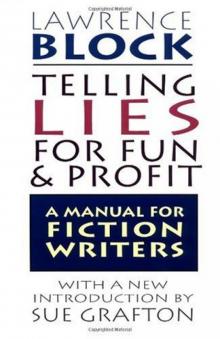 Manual For Fiction Writers
Manual For Fiction Writers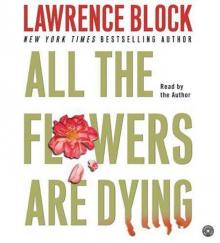 All the Flowers Are Dying
All the Flowers Are Dying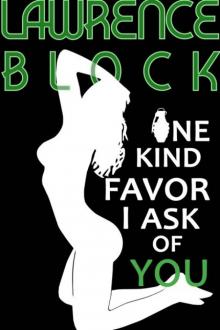 One Kind Favor I Ask of You (Kit Tolliver #8) (The Kit Tolliver Stories)
One Kind Favor I Ask of You (Kit Tolliver #8) (The Kit Tolliver Stories)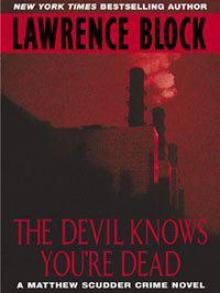 The Devil Knows You’re Dead
The Devil Knows You’re Dead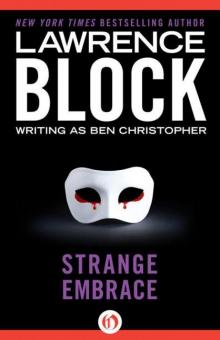 Strange Embrace
Strange Embrace Clean Slate (Kit Tolliver #4) (The Kit Tolliver Stories)
Clean Slate (Kit Tolliver #4) (The Kit Tolliver Stories)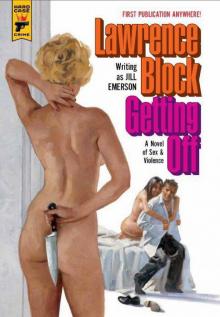 Hard Case Crime: Getting Off
Hard Case Crime: Getting Off You Can Call Me Lucky (Kit Tolliver #3) (The Kit Tolliver Stories)
You Can Call Me Lucky (Kit Tolliver #3) (The Kit Tolliver Stories) Zeroing In (Kit Tolliver #11) (The Kit Tolliver Stories)
Zeroing In (Kit Tolliver #11) (The Kit Tolliver Stories) Rude Awakening (Kit Tolliver #2) (The Kit Tolliver Stories)
Rude Awakening (Kit Tolliver #2) (The Kit Tolliver Stories) Unfinished Business (Kit Tolliver #12) (The Kit Tolliver Stories)
Unfinished Business (Kit Tolliver #12) (The Kit Tolliver Stories)